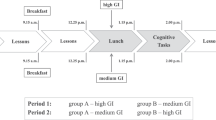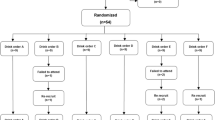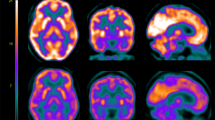Abstract
Objective:
To find useful methods for the studies of cognitive function during a postprandial period, and to use these methods to evaluate function after test meals differing in post meal glycaemia.
Subjects/Methods:
Forty healthy volunteers aged 49–70 years were studied. A glucose solution (glucose 50 g) was provided through either a bolus or sipping regimen at breakfast to simulate a high-GI or a low-GI breakfast, respectively. Cognitive tests of working memory (WM) were performed at 35, 90, 120 and 150 min after commencing the breakfast, and a test of selective attention (SA) was performed at 170 min.
Results:
Subjects with higher glucose tolerance performed better in the cognitive tests (P<0.05). After entering glucose tolerance as covariate, the subjects performed better in the working memory test at 90 min (P<0.034) and in the selective attention test at 170 min (P<0.017) after the simulated low-glycaemic index (GI) breakfast compared with the simulated high-GI breakfast.
Conclusion:
Possibly, the cognitive functions tested were enhanced by avoiding a sharp decline in blood glucose concentration and by maintaining a higher glycaemia in the late postprandial period, respectively. A low-GI diet is preferable in the prevention of the risk of cognitive decline as a result of less efficient glucose regulation.
This is a preview of subscription content, access via your institution
Access options
Subscribe to this journal
Receive 12 print issues and online access
$259.00 per year
only $21.58 per issue
Buy this article
- Purchase on Springer Link
- Instant access to full article PDF
Prices may be subject to local taxes which are calculated during checkout


Similar content being viewed by others
References
Benton D, Parker PY (1998). Breakfast, blood glucose, and cognition. Am J Clin Nutr 67, 772S–778S.
Benton D, Ruffin MP, Lassel T, Nabb S, Messaoudi M, Vinoy S et al. (2003). The delivery rate of dietary carbohydrates affects cognitive performance in both rats and humans. Psychopharmacology (Berl) 166, 86–90.
Brand-Miller JC (2003). Glycemic load and chronic disease. Nutr Rev 61, S49–55.
Brand-Miller JC (2004). Glycemic index in relation to coronary disease. Asia Pac J Clin Nutr 13, S3.
Convit A, Wolf OT, Tarshish C, de Leon MJ (2003). Reduced glucose tolerance is associated with poor memory performance and hippocampal atrophy among normal elderly. Proc Natl Acad Sci USA 100, 2019–2022.
Daneman M, Carpenter PA (1980). Individual differences in working memory and reading. J Verbal Learning Verbal Behav 19, 450–466.
DeFronzo RA, Ferrannini E (1991). Insulin resistance. A multifaceted syndrome responsible for NIDDM, obesity, hypertension, dyslipidemia, and atherosclerotic cardiovascular disease. Diabetes Care 14, 173–194.
Donohoe RT, Benton D (1999). Cognitive functioning is susceptible to the level of blood glucose. Psychopharmacology (Berl) 145, 378–385.
Engle RW, Carullo JJ, Collins KW (1991). Individual differences in working memory for comprehension and following directions. J Ed Res 84, 253–262.
Engle RW, Kane MJ, Tuholski SW (1999). Individual differences in working memory capacity and what they tell us about controlled attention, general fluid intelligence, and functions of the prefrontal cortex. In: Miake A, Shah P (eds). Models of Working Memory: Mechanisms of Active Maintenance and Executive Controll. Cambridge University Press: New York, pp 102–134.
Ferrannini E, Haffner SM, Mitchell BD, Stern MP (1991). Hyperinsulinaemia: the key feature of a cardiovascular and metabolic syndrome. Diabetologia 34, 416–422.
Frost G, Dornhorst A (2000). The relevance of the glycaemic index to our understanding of dietary carbohydrates. Diabet Med 17, 336–345.
Gallacher JE, Pickering J, Elwood PC, Bayer AJ, Yarnell JW, Ben-Shlomo Y (2005). Glucoregulation has greater impact on cognitive performance than Macro-vascular disease in men with type 2 diabetes: data from the Caerphilly Study. Eur J Epidemiol 20, 761–768.
Jenkins DJ, Kendall CW, Augustin LS, Franceschi S, Hamidi M, Marchie A et al. (2002). Glycemic index: overview of implications in health and disease. Am J Clin Nutr 76, 266S–273S.
Kaplan RJ, Greenwood CE, Winocur G, Wolever TM (2000). Cognitive performance is associated with glucose regulation in healthy elderly persons and can be enhanced with glucose and dietary carbohydrates. Am J Clin Nutr 72, 825–836.
Kiewra KA, Benton SL (1988). The relationship between information processing ability and notetaking. Contemporary Ed Psychol 13, 33–34.
Kyllonen PC (1996). Is working memory capacity Spearman's g?. In: Dennis I, Tapsfield P (eds). Human Abilities: Their Nature and Measurement. Erlbaum.: Mahwah, NJ, pp 49–75.
Kyllonen PC, Christal RE (1990). Reasoning ability is (little more than) working-memory capacity? Intelligence 14, 389–433.
Kyllonen PC, Stephens DL (1990). Cognitive abilities as determinants of success in acquiring logic skill. Learning Indiv Diff 2, 129–150.
Liu S, Willett WC, Stampfer MJ, Hu FB, Franz M, Sampson L et al. (2000). A prospective study of dietary glycemic load, carbohydrate intake, and risk of coronary heart disease in US women. Am J Clin Nutr 71, 1455–1461.
Martin PY, Benton D (1999). The influence of a glucose drink on a demanding working memory task. Physiol Behav 67, 69–74.
McKeown NM, Meigs JB, Liu S, Saltzman E, Wilson PW, Jacques PF (2004). Carbohydrate nutrition, insulin resistance, and the prevalence of the metabolic syndrome in the Framingham Offspring Cohort. Diabetes Care 27, 538–546.
McNay EC, Fries TM, Gold PE (2000). Decreases in rat extracellular hippocampal glucose concentration associated with cognitive demand during a spatial task. Proc Natl Acad Sci USA 97, 2881–2885.
McNay EC, Gold PE (2001). Age-related differences in hippocampal extracellular fluid glucose concentration during behavioral testing and following systemic glucose administration. J Gerontol A Biol Sci Med Sci 56, B66–B71.
McNay EC, McCarty RC, Gold PE (2001). Fluctuations in brain glucose concentration during behavioral testing: dissociations between brain areas and between brain and blood. Neurobiol Learn Mem 75, 325–337.
Messier C (2004). Glucose improvement of memory: a review. Eur J Pharmacol 490, 33–57.
Messier C, Gagnon M, Knott V (1997). Effect of glucose and peripheral glucose regulation on memory in the elderly. Neurobiol Aging 18, 297–304.
Messier C, Tsiakas M, Gagnon M, Desrochers A, Awad N (2003). Effect of age and glucoregulation on cognitive performance. Neurobiol Aging 24, 985–1003.
Papanikolaou Y, Palmer H, Binns MA, Jenkins DJ, Greenwood CE (2006). Better cognitive performance following a low-glycaemic-index compared with a high-glycaemic-index carbohydrate meal in adults with type 2 diabetes. Diabetologia 49, 855–862.
Pollitt E, Cueto S, Jacoby ER (1998). Fasting and cognition in well- and undernourished schoolchildren: a review of three experimental studies. Am J Clin Nutr 67, 779S–784S.
Radeborg K, Briem V, Hedman LR (1999). The effect of concurrent task difficalty on working memory during simulated driving. Ergonomics 42, 767–777.
Riby LM (2004). The impact of age and task domain on cognitive performance: a meta-analytic review of the glucose facilitation effect. Brain Impairment 5, 145–165.
Ryan CM, Geckle M (2000). Why is learning and memory dysfunction in Type 2 diabetes limited to older adults? Diabetes Metab Res Rev 16, 308–315.
Salmeron J, Ascherio A, Rimm EB, Colditz GA, Spiegelman D, Jenkins DJ et al. (1997a). Dietary fiber, glycemic load, and risk of NIDDM in men. Diabetes Care 20, 545–550.
Salmeron J, Manson JE, Stampfer MJ, Colditz GA, Wing AL, Willett WC (1997b). Dietary fiber, glycemic load, and risk of non-insulin-dependent diabetes mellitus in women. J Am Med Assoc 277, 472–477.
Scholey AB, Harper S, Kennedy DO (2001). Cognitive demand and blood glucose. Physiol Behav 73, 585–592.
Scholey AB, Laing S, Kennedy DO (2006). Blood glucose changes and memory: Effects of manipulating emotionality and mental effort. Biol Psychol 71, 12–19.
Strachan MW, Deary IJ, Ewing FM, Frier BM (1997). Is type II diabetes associated with an increased risk of cognitive dysfunction? A critical review of published studies. Diabetes Care 20, 438–445.
Acknowledgements
This work was supported by the European Commission QLK1-2001-00431 (EUROSTARCH).
Author information
Authors and Affiliations
Corresponding author
Additional information
Guarantor: I Björck.
Contributors: AN coordinated the study, was responsible for the study design, the experimental work, the collection and analysis of the blood tests and the evaluation and writing of the paper. KR had the primary responsibility for the cognitive tests and the statistical analysis, and was involved in the evaluation and writing of the paper. IB was the guarantor for the funding of the study and was involved in the study design, and the evaluation and writing of the paper. None of the authors had any conflict of interest.
Rights and permissions
About this article
Cite this article
Nilsson, A., Radeborg, K. & Björck, I. Effects of differences in postprandial glycaemia on cognitive functions in healthy middle-aged subjects. Eur J Clin Nutr 63, 113–120 (2009). https://doi.org/10.1038/sj.ejcn.1602900
Received:
Revised:
Accepted:
Published:
Issue Date:
DOI: https://doi.org/10.1038/sj.ejcn.1602900
Keywords
This article is cited by
-
Short-term effects of carbohydrates differing in glycemic index (GI) consumed at lunch on children’s cognitive function in a randomized crossover study
European Journal of Clinical Nutrition (2020)
-
Impact of rye-based evening meals on cognitive functions, mood and cardiometabolic risk factors: a randomized controlled study in healthy middle-aged subjects
Nutrition Journal (2018)
-
Baseline glucoregulatory function moderates the effect of dairy milk and fruit juice on postprandial cognition in healthy young adults
European Journal of Nutrition (2018)
-
The effect of fasting on surgical performance
Surgical Endoscopy (2016)
-
The effect of using isomaltulose (Palatinose™) to modulate the glycaemic properties of breakfast on the cognitive performance of children
European Journal of Nutrition (2015)



